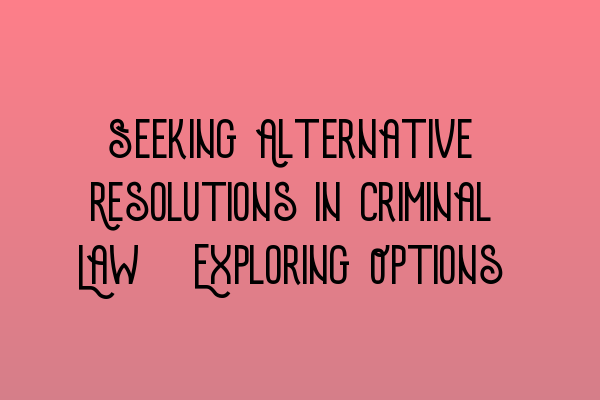Seeking Alternative Resolutions in Criminal Law: Exploring Options
When it comes to criminal law, the traditional approach has always been to seek resolution through a trial in court. However, in recent years, there has been a growing recognition of the benefits of alternative dispute resolution methods in criminal cases.
In this blog post, we will explore the various options available for seeking alternative resolutions in criminal law, highlighting the advantages they offer and how they can be effectively utilized. Let’s dive in!
1. Restorative Justice
Restorative justice is a process that brings together victims, offenders, and other affected parties to actively participate in resolving the harm caused by a crime. It focuses on healing the individuals impacted by the offense rather than solely on punishment.
This approach allows victims to express their feelings and have a say in the resolution, while offenders gain a better understanding of the consequences of their actions. Restorative justice programs have shown promising results in reducing reoffending rates and promoting rehabilitation.
To learn more about the potential benefits of restorative justice, check out our SQE 1 Practice Mocks FLK1 FLK2 article.
2. Diversion Programs
Diversion programs offer an opportunity for individuals accused of minor offenses to avoid prosecution by participating in rehabilitative interventions. These programs often involve counseling, community service, or education aimed at addressing the underlying causes of criminal behavior.
Diversion programs can be particularly valuable for young first-time offenders, as they provide a chance to learn from their mistakes and avoid a permanent criminal record. They also alleviate some of the burdens on overcrowded courts and reduce the strain on the criminal justice system.
To find out more about diversion programs and their potential impact on the criminal justice system, read our article on SQE 2 Preparation Courses.
3. Plea Bargaining
Plea bargaining is a negotiation process between the prosecution and the defense, where the defendant agrees to plead guilty in exchange for a reduced sentence or a lesser charge. This approach allows for a more efficient resolution of cases, reducing both the time and resources required for a trial.
Although plea bargaining has received some criticism for potential abuses and coercion, it remains a common practice in many jurisdictions. It offers defendants the opportunity to take responsibility for their actions and receive a more lenient outcome, while also helping to alleviate the backlog of cases in the court system.
If you’re interested in learning more about the legal aspects of plea bargaining, our article on SRA SQE Exam Dates provides valuable insights.
4. Mediation
Mediation involves the use of a neutral third party, the mediator, who facilitates communication and negotiation between the victim and the offender. It allows both parties to express their perspectives, discuss the harm caused, and collaboratively work towards a mutually agreeable resolution.
Mediation can be particularly effective in cases where there is a chance for repairing relationships and finding common ground. It encourages dialogue, empathy, and understanding, leading to outcomes that are tailored to the specific needs and concerns of those involved.
If you’re preparing for your SQE exams and want to test your knowledge of criminal law, check out our SQE 1 Practice Exam Questions article for valuable practice materials.
Conclusion
Seeking alternative resolutions in criminal law offers many advantages, from promoting healing and rehabilitation to reducing the burden on the court system. Restorative justice, diversion programs, plea bargaining, and mediation are just a few examples of the options available for achieving such resolutions.
As criminal law practitioners, it is important for us to remain open to these alternative approaches and explore how they can best serve our clients and the justice system as a whole.
If you’re interested in further exploring the topic or seeking professional advice on criminal law matters, feel free to get in touch with our team at SQE Criminal Law & Practice Law UK.
